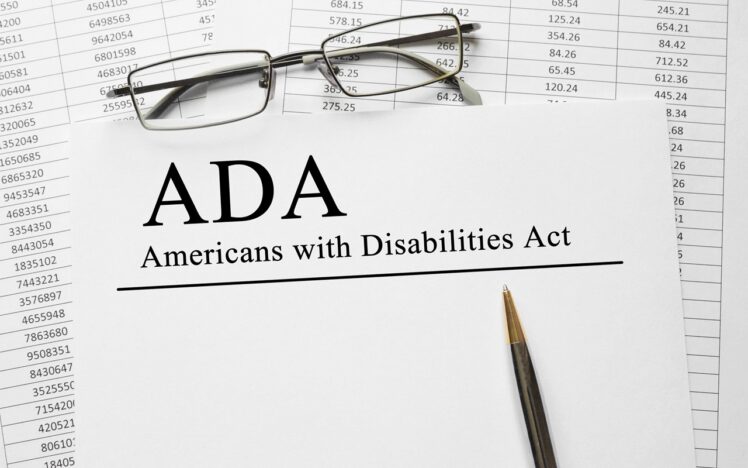Disability Discrimination in The Workplace: Know Your Rights And Protections

Are you a person with a disability facing discrimination at work? You have rights and there are resources to help protect you. Knowing your rights is key to protecting yourself from unfair treatment and ending the cycle of discrimination in the workplace. Get informed and stay empowered with this guide to understanding disability discrimination.
Definition of Disability Discrimination

Source: pinterest.com
Disability discrimination occurs when an employer, or other covered entities, treats an individual differently and/or worse than other employees or applicants because of a disability. The difference of treatment may include not hiring the applicant, failing to make reasonable accommodations for a qualified employee’s disability, or terminating employment. A disability lawyer can provide legal assistance to individuals who have faced discrimination in the workplace due to their disability and help them navigate the process of filing a complaint with the EEOC.
In order for discrimination to be considered in violation of the law, it must be established that the claimant is “disabled” according to the applicable federal and state definitions of disability. An individual is considered disabled if he or she has:
- A physical or mental impairment that substantially limits one or more major life activities;
- A record of such an impairment;
- Or is regarded as having such an impairment.
The two major laws that govern disability discrimination on a federal level are Title I and Title V of the Americans with Disabilities Act (ADA), which protect those individuals who have a disability from being discriminated against in the workplace due to their disability status. Therefore, employers are subject to treating disabled employees equally and providing reasonable work accommodations. If this fails to occur, it is at this point that complaints may be filed with the U.S Equal Employment Opportunity Commission (EEOC).
The Americans with Disabilities Act (ADA)
The Americans with Disabilities Act of 1990, commonly referred to as the ADA, is a federal civil rights law that protects individuals with disabilities from discrimination in all areas of public life, including employment. The ADA prohibits discrimination against any qualified individual with a disability and requires employers to make reasonable adaptations so that disabled persons can perform their duties in a safe and effective manner.
The ADA also grants disabled individuals access to public accommodations such as restaurants, hotels, theaters, stadiums and more. Additionally, the ADA prohibits employers from discriminating against applicants and employees based on their association with disabled individuals (for example friends or family members).
The basic premise underlying the ADA is that employers have an obligation to provide “reasonable accommodations” for those who qualify as disabled under the law meaning they have an impairment or mental health condition which substantially limits one or more major life activities. Generally speaking if an employer is informed of a need for accommodation they must provide it unless doing so would cause undue hardship to the employer which is extremely difficult for an employer to demonstrate.
While accommodation may be provided in many forms such as modified job requirements, restructuring jobs or providing additional equipment it should be noted that employers are not required to lower production standards for performance or eliminate essential functions from job descriptions. It should also be kept in mind that other forms of discrimination are also prohibited including discrimination based on age and gender identity.
Rights and Protections Under the ADA

Source: youtube.com
The Americans with Disabilities Act (ADA) is a federal civil rights law designed to protect individuals with disabilities from discrimination in all areas of life, including the workplace. The ADA prohibits employers from treating current or potential employees differently based on their disability and also requires employers to provide reasonable accommodations for disabled employees. A “reasonable accommodation” is defined as any change in the job or workplace that allows a disabled employee to perform the essential functions of their job role and is necessary due to their disability.
Under the ADA, employers are legally required to make reasonable accommodations for employees with disabilities unless doing so would create an undue hardship (or significant difficulty or expense). Common examples of accommodations allowed under the ADA could include: providing modified equipment, allowing more flexible work schedules, providing extended leave time, reassigning duties/tasks, offering telework opportunities as well as making physical changes to a workspace.
Prohibited Employment Practices
Employers are prohibited from discriminating against job seekers and employees on the basis of disability. This form of discrimination is expressly forbidden under the Americans with Disabilities Act (ADA). Examples of discriminatory employment practices include:
-Refusal to hire someone who is qualified for a position,
-Failure to make reasonable accommodations for a person’s disability,
-Segregating or isolating a disabled employee from co-workers, customers or vendors because of their disability
-Using unfair hiring criteria that have an adverse impact on individuals with disabilities such as requiring specific educational requirements or years of experience.
-Discriminating wages or other benefits based on an individual’s disability.
The ADA also prohibits harassing job seekers and employees based on their real or perceived disabilities. Harassment can take many forms, including jokes and taunts based on negative stereotypes, inappropriate physical contact and egregious comments about an individual’s appearance that relate to their disability. All workers have the right to work in a safe environment without fear of harassment due to their mental or physical status.
Conclusion

Source: youtube.com
In conclusion, it is important to know the laws and regulations protecting individuals with disabilities so that you are aware of your rights within a workplace. All employers, regardless of their size or sector, must legally comply with the Americans with Disabilities Act of 1990 and Section 504 of the Rehabilitation Act. It is essential to remember that no employer may discriminate against an employee or applicant based on any protected class status, including disability status.
As an employee or job applicant, you have the right to be protected from discrimination in all phases of your work life. If you feel that you have been subjected to disability-based discrimination at work, it’s important to consult a qualified disability discrimination attorney who can help ensure your rights are protected.





